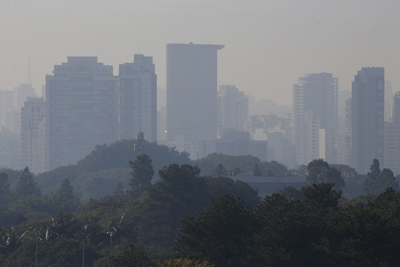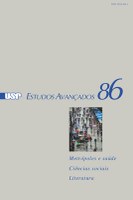Issue #86 of the journal 'Estudos Avançados' brings a dossier on metropolises and health
 The relationship between the spread of diseases and the lifestyle of big cities is finally getting significant attention of a branch of medicine after decades of investment in hospital technology and drug development. The risk of contracting infectious diseases increases with the presence of factors such as air pollution, lack of green space in urban areas, low quality of public transport and poor housing conditions.
The relationship between the spread of diseases and the lifestyle of big cities is finally getting significant attention of a branch of medicine after decades of investment in hospital technology and drug development. The risk of contracting infectious diseases increases with the presence of factors such as air pollution, lack of green space in urban areas, low quality of public transport and poor housing conditions.
In order to explore this topic and to encourage changes, issue #86 of the Institute's journal 'Estudos Avançados' brings a dossier of seven articles on metropolises and health. "This dossier takes up one of the journal's goals: the combination of the objective study of Brazilian social problems with consistent and responsible public policy proposals," explains Alfredo Bosi, editor of the publication. The full content is already available at SciELO. To purchase a printed version (Portuguese only), please write to estavan@usp.br.
 Paulo Saldiva, director of the IEA and a professor at the USP's School of Medicine, has closely worked with this issue, both with the publication of an article and with editorial advice. For years he has led research seeking to trace potential ways to improve the quality of life in cities. In the new issue's opening article, Saldiva, together with Laís Fajerstajn and Mariana Veras, gives concrete examples to answer how cities can improve or hinder the health of their residents.
Paulo Saldiva, director of the IEA and a professor at the USP's School of Medicine, has closely worked with this issue, both with the publication of an article and with editorial advice. For years he has led research seeking to trace potential ways to improve the quality of life in cities. In the new issue's opening article, Saldiva, together with Laís Fajerstajn and Mariana Veras, gives concrete examples to answer how cities can improve or hinder the health of their residents.
"The anti-smoking law, which banned smoking in collective indoor spaces in the State of São Paulo in 2009, has reduced the exposure of nonsmokers to tobacco smoke. This law has also resulted in the decrease of the cigarettes / day rate among smokers," say the authors, completing with an opposite example: "The mobility crisis [in São Paulo] affects health not only because of the time lost in traffic and the adverse impacts of exposure to air pollution but also for its contribution to obesity, emotional stress, among others. In a congested city, children do not play in the street and adults do not return home for lunch", they argue.
In addition to this first article, six others make up the dossier "Metropolises and health". The authors are Aluisio Cotrim Segurado, Alex Jones Cassenote, Expedito de Albuquerque Luna, Suzana Pasternak, Helena Ribeiro, Célia Regina Pesquero, Micheline de Sousa Zanotti S. Coelho, Steffani Nikoli Dapper, Caroline Spohr, Roselaine Ruviaro Zanini, Emílio Telesi Júnior, Luís Fernando Amato-Lourenço, Tiana Carla Lopes Moreira, Bruna Lara de Arantes, Demóstenes Ferreira da Silva Filho and Thais Mauad.
The new issue of the journal also features a set of articles on literature, with readings of poetry and fictional works, and social sciences. Bernardo Sorj, a former visiting professor at the IEA, contributes with a text on democratic coexistence as polytheism of values. There are also essays on the Brazilian truth commission (by journalist Eugênio Bucci), on the Brazilian Civil Rights Framework for the Internet, on the political construction of Brazil, and on the public university in neoliberal times. The list below contains the names of the authors who have contributed with each one of the addressed themes:
Social sciences and the search for a meaning
Bernardo Sorj
Danilo Martuccelli
Ricardo Abramovay
Literature
Alfredo Bosi
José Feres Sabino
André Luis Rodrigues
Diego A. Molina
Alessandra Matias Querido
Current affairs
Eduardo Tomasevicius Filho
Jacques Marcovitch
Comments
Eugênio Bucci
Rubens R. Sawaya
Samuel Araújo
Bernardo Parodi Svartman
Matheus Cardoso da Silva
Photo: Marcos Santos/USP Imagens
